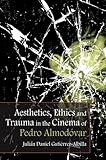Aesthetics, Ethics and Trauma in the Cinema of Pedro Almodóvar / Julián Daniel Gutiérrez-Albilla.
Material type: TextPublisher: Edinburgh : Edinburgh University Press, [2022]Copyright date: ©2017Description: 1 online resource (232 p.) : 40 B/W illustrationsContent type:
TextPublisher: Edinburgh : Edinburgh University Press, [2022]Copyright date: ©2017Description: 1 online resource (232 p.) : 40 B/W illustrationsContent type: - 9781474400107
- 9781474400114
- 791.4302/33092 23
- PN1998.3.A46 G88 2017
- PN1998.3.A46 G88 2017eb
- online - DeGruyter
| Item type | Current library | Call number | URL | Status | Notes | Barcode | |
|---|---|---|---|---|---|---|---|
 eBook
eBook
|
Biblioteca "Angelicum" Pont. Univ. S.Tommaso d'Aquino Nuvola online | online - DeGruyter (Browse shelf(Opens below)) | Online access | Not for loan (Accesso limitato) | Accesso per gli utenti autorizzati / Access for authorized users | (dgr)9781474400114 |
Frontmatter -- Contents -- List of Figures -- Acknowledgements -- Introduction: Encountering the Trace -- 1. Im-Possibility of Not-Returning: Volver -- 2. Im-Possibility of Not-Sharing: Todo sobre mi madre -- 3. Im-Possibility of Not-Writing Otherwise: La mala educación -- 4. Im-Possibility of Not-Succumbing: La piel que habito -- Notes -- References -- Index
restricted access online access with authorization star
http://purl.org/coar/access_right/c_16ec
A new critical and theoretical approach to a neglected aspect of Pedro Almodóvar’s cinemaOne of Spain’s most celebrated directors, Pedro Almodóvar has won international recognition for his dark comedy-dramas like Women on the Verge of a Nervous Breakdown, All About My Mother and Volver. Reconceptualising Almodóvar’s films as theoretical and political resources, this innovative book examines a neglected aspect of his cinema: its engagement with the traumatic past, with subjective and collective memory, and with the ethical and political meanings that result from this engagement. With close readings of Almodóvar’s films from the 1990s and 2000s, including Bad Education and The Skin I Live In, Julián Daniel Gutiérrez-Albilla explores how Almodóvar’s cinema mourns and witnesses the traces of trauma, drawing on theoretical approaches from trauma studies, psychoanalysis, philosophy, film studies and visual studies to suggest that his work proposes an ethical model based on our compassionate relations to others, and envisions a world co-inhabited by plurality and difference.Key featuresExplores how Pedro Almodóvar engages with the traumatic pastIncludes close readings of Almodóvar’s films from the 1990s and 2000sDraws on theoretical approaches from trauma studies, psychoanalysis, philosophy, film studies and visual studies
Mode of access: Internet via World Wide Web.
In English.
Description based on online resource; title from PDF title page (publisher's Web site, viewed 29. Jun 2022)


